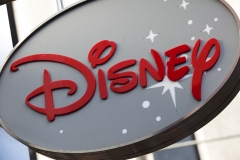
Featured is a Disney store sign. (Photo credit: In Pictures Ltd./Corbis via Getty Images)
Consider these factoids in chronological succession:
- In mid-August, the Department of Homeland Security (DHS) ran a second H-1B visa lottery for the year despite, as my colleague David North noted, a lack of interest.
- On Sept. 25, Law360 (partially behind a paywall) reported that the Department of Labor (DOL) had freed up $150 million from H-1B user fees to support a program to train American workers due to “critical shortages of skilled workers” allegedly brought on by the Trump administration’s “ban” on the importation of H-1B workers (which still amounts to a total of 85,000 visas, and therefore jobs, that DHS has shown itself determined to give away, despite the administration’s emphasis on “hiring American”).
- On Sept. 30, Disney Corporation announced that it is laying off 28,000 workers from its theme parks due to the disastrous COVID pandemic we are still living through.
The import of DHS’s unnecessary August lottery is that a whole host of H-1B visas will be granted to foreigners to come and work in the United States, even though the economy is still suffering and unemployment rates are still disturbingly high.
Conversely, DOL can at least be said to be trying to do something to ease the plight of disenfranchised American workers by apportioning funds toward training programs — although there is reason enough to question whether there actually is a “critical shortage,” given the lack of interest in the initial H-1B lottery and the massive layoffs at employers such as Disney. There’s also plenty of reason to doubt exactly how “skilled” many H-1B recipients are: Once again, thanks to North, we know that significant numbers of these individuals come from distinctly lackluster institutions of learning, not just from the American university system, but also within the hierarchy of their own countries.
Finally, there is the matter of the massive layoffs at Disney (and Carnival Cruise Lines and Sea World and other theme parks before it). Two-thirds of those laid off are part-time workers, presumably less-skilled; but since the layoffs are hitting workers “at all levels,” one wonders how many of those laid off will be H-1B workers — who tend to work for lower wages than comparable American workers — and how many will be Americans who forfeit their jobs while the H-1Bs go unscathed.
Past history suggests that Disney will go straight for the jugular and dump the Americans and keep the foreign workers. In this, they’re not alone; it is a pattern often repeated in the corporate world. It would have been nice for Disney (or any of the others) to make an affirmative statement about doing all it can to protect American jobs despite the need for layoffs. That it didn’t is pretty suggestive that history will repeat itself.
Collectively, the juxtaposition of these three things is enough to make one’s head spin and wonder if anyone at all is in charge of strategic thinking in our federal government’s bureaucracies, where foreign workers vs. American jobs are concerned, or whether we are floating along rudderless.
And where is Congress? Should there not be sane statutory provisions regarding who gets pink-slipped at a time of massive layoffs? And should those provisions not be protecting American employees instead of permitting them to be sacrificed in favor of so-called “temporary” foreign workers?
Dan Cadman is a Fellow at the Center for Immigration Studies and is a retired INS / ICE official with thirty years of government experience. Mr. Cadman served as a senior supervisor and manager at headquarters, as well as at field offices both domestically and abroad.
Editor’s Note: This piece originally appeared on the Center for Immigration Studies.

.jpg?fit=60,39&ssl=1)
